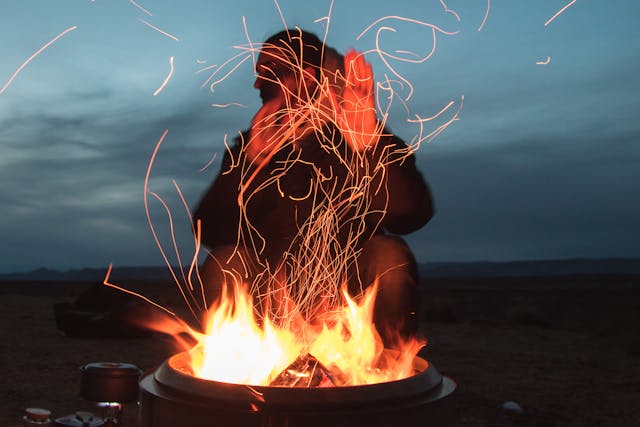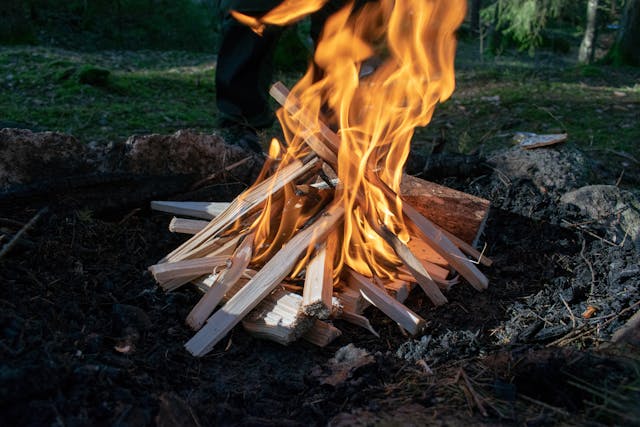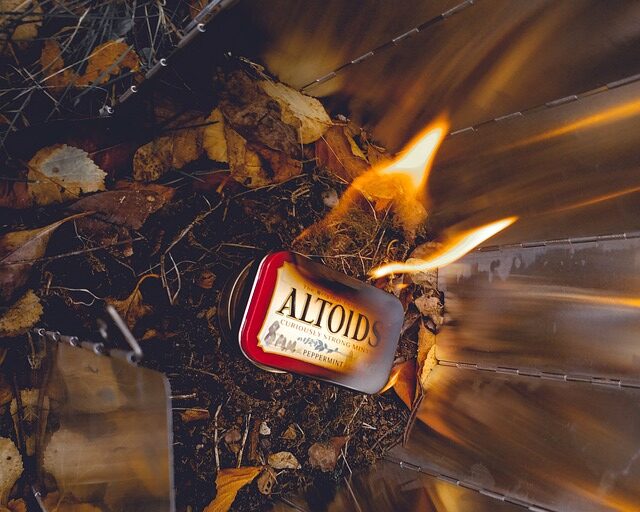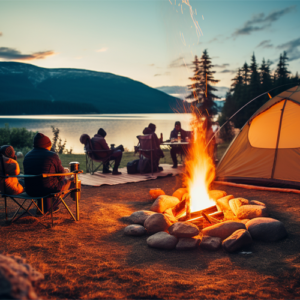If you’ve spent any time camping or out in the bush, you know the importance of a reliable stove.
Sure, cooking over an open fire has its appeal, but it can be slow, inefficient, and unpredictable. That’s where a rocket stove kit comes in. These small, portable stoves burn incredibly hot with very little fuel, making them a great addition to any camping setup, whether you’re out in the wilderness or just preparing for an emergency.
I’ve been using rocket stoves for a while now, and they’ve earned a permanent place in my gear. Let me walk you through why they’re so useful, how they work, and what to look for when picking the right rocket stove kit.
What is a Rocket Stove Kit?
A rocket stove is a type of efficient cooking stove that’s designed to burn wood and other biomass efficiently, using less fuel to generate more heat. It works by drawing air through the combustion chamber, which funnels the heat upwards in a concentrated column.
The design allows the fire to burn hotter and more efficiently than a typical open fire, which means you can cook faster and with less wood.
A rocket stove kit usually includes the basic components needed to build and operate the stove, often in a way that makes it easy to pack up and take with you. Some kits are designed for quick assembly, while others come pre-built but break down into compact pieces for storage.
Most kits are made from steel or other heat-resistant materials that can withstand the intense heat these stoves generate.
Why Choose a Rocket Stove?
One of the biggest reasons to go with a rocket stove is fuel efficiency. Unlike a regular campfire that burns through wood quickly and unevenly, a rocket stove uses a small amount of wood—typically twigs, sticks, or small branches—and burns it completely.
Because of its design, you get more heat from less fuel, which means you don’t have to spend half your time gathering wood. If you’ve ever had to build a fire from scratch after a long day of hiking, you’ll know why this is a big deal.
Another reason I like using a rocket stove is that it’s incredibly fast. Once you’ve got it going, the heat is intense and concentrated, which makes cooking quicker than over a traditional campfire.
You can boil water in minutes or cook up a meal without waiting forever for the fire to build. It’s a much more controlled process, and that’s something I really appreciate when I just want to get a meal going without the hassle.
How to Use a Rocket Stove Kit
Setting up and using a rocket stove is straightforward, but it’s a little different from lighting a standard fire. Most rocket stove kits are designed for quick assembly, and some fold down into flat pieces that you can slot together on the spot.
Once assembled, the basic steps are the same no matter which model you’re using. Start by gathering your fuel. You don’t need large logs—just a handful of sticks or twigs will do the job.
Once you’ve got enough fuel, arrange a few pieces inside the stove’s fuel chamber, leaving enough room for air to circulate. Light the fuel using kindling or a firestarter, and the stove’s design will naturally pull air into the chamber, feeding the fire and concentrating the heat upwards toward the cooking surface.
One of the things I’ve noticed about using a rocket stove is that you don’t need to keep feeding it large amounts of fuel once it’s burning. The airflow keeps the fire hot with minimal input, so you can focus more on cooking and less on maintaining the fire.
Cooking with a Rocket Stove
Cooking on a rocket stove is a lot like using a high-powered burner. Because the heat is concentrated, it’s easy to control how quickly things cook.
You can simmer or sear depending on how much fuel you add or how close your cooking surface is to the flame. If you’re boiling water for coffee or cooking something simple like rice or pasta, the heat is intense enough that it’ll be done in no time.
The rocket stove’s design makes it ideal for both solo trips and larger group cooking. For example, I’ve used my rocket stove to cook a full meal in a cast iron skillet—everything from frying eggs and bacon to sautéing vegetables.
The stable, flat surface makes it easy to cook with pots or pans without worrying about balance, which can be a problem with open fires or some portable stoves.
Another thing I like is that cleanup is minimal. Since the fuel burns down almost completely, you’re left with only a small amount of ash to deal with, and the stove itself cools down quickly once you’re done.
Durability and Portability
One of the key benefits of a rocket stove kit is how portable it is. The kits I’ve used are made from sturdy, heat-resistant materials like stainless steel, which means they can take a beating.
Despite that durability, most rocket stove kits are designed to break down or fold up, making them easy to slip into a backpack or store in your vehicle.
Some models are so compact that you wouldn’t even notice the extra weight or bulk in your pack, but they can still deliver serious cooking power when set up.
Durability is a big selling point for me. I’ve had cheap camp stoves in the past that didn’t hold up after a few trips, but a well-made rocket stove kit is built to last.
The heat these stoves generate is intense, so you need something that can handle that without warping or breaking down over time.
Picking the Right Rocket Stove Kit
There are a lot of rocket stove kits on the market, and picking the right one comes down to how you plan to use it. If you’re primarily backpacking, you’ll want something lightweight and compact.
For car camping or emergency preparedness, you might prefer a larger model that offers more stability and cooking space.
One feature I always look for is how easy the stove is to assemble and disassemble. A good kit should come together quickly and not require any tools. I also check the weight capacity to make sure it can handle heavier pots or pans, especially if I’m planning to use cast iron.
Finally, pay attention to airflow design. Some stoves have better airflow systems than others, which makes a big difference in how efficiently they burn and how hot they get.
A well-designed rocket stove will keep a steady, intense flame going with minimal effort on your part.
Final Thoughts
Rocket stove kits are a great investment if you’re looking for a portable, fuel-efficient way to cook outdoors. They’re easy to use, incredibly efficient, and can handle just about any cooking task you throw at them.
Whether you’re out camping, preparing for an emergency, or just want a reliable backup for your backyard setup, a rocket stove kit is a practical, no-fuss option that’s hard to beat.
If you’ve never used one before, I recommend giving it a try on your next trip. It’s one of those pieces of gear that quickly becomes indispensable once you see how well it works.
You might as well be interested in
-

A new sample Post by me
Lorem ipsum dolor sit amet, consectetur adipiscing elit. Pellentesque imperdiet tincidunt augue, sit amet pharetra massa condimentum varius. Ut condimentum turpis blandit augue ultricies porta.…
-

Bushcraft Fireplaces: Crafting the Perfect Fire Pit for the Wild
Bushcraft Fireplace: How to Build the Perfect Fire Pit in the Wild A good campfire is more than just flames and heat. When you’re out…
-

Bushcraft Fire Starters: Gear That Gets Your Fire Going Every Time
Bushcraft Fire Starter: Choosing the Best Tool for Reliable Fires When you’re out in the woods, knowing how to start a fire is more than…
-

Bushcraft Fire Plugs: The Quickest Way to Spark a Flame in Any Weather
Bushcraft Fire Plugs: The Quick and Reliable Way to Start a Fire When you’re out in the wild, there are few things as crucial as…
-

Rocket Stove Kits: Compact Cooking Power for the Outdoors
If you’ve spent any time camping or out in the bush, you know the importance of a reliable stove. Sure, cooking over an open fire…
-

DIY Fire Starters: Cheap, Easy, and Reliable Ways to Spark a Flame
DIY Fire Starters: Simple and Reliable Methods You Can Make at Home Starting a fire in the wild isn’t always as easy as it looks,…
-

Bushcraft Fire Kit – Make It Hot
Creating the Ultimate Bushcraft Fire Kit A bushcraft fire kit is one of the most reliable tools you can carry when venturing into the wilderness.…




